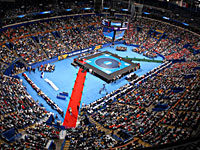NCAA News Archive - 2008
« back to 2008 | Back to NCAA News Archive Index
|
The NCAA News
The National Wrestling Coaches Association wants the academic performance of wrestling student-athletes to improve, and members are taking steps to do something about it.
After observing the work done by the Baseball Academic Enhancement Working Group, the NWCA assembled coaches and administrators to begin working on a plan for the wrestling community. Led by NWCA Executive Director Mike Moyer, the group began working last year and has already made an impact.
The most impressive display of the group’s commitment to academics is its pledge of $300,000 to create and run an academy for wrestling coaches. To be crafted and administered by the Institute for the Study of Youth Sports at Michigan State, the academy will give coaches strategies for improving the academic success of their student-athletes and stressing the importance of off-the-mat activities like community service and leadership.
The ultimate goal, institute director Dan Gould said, is to reduce the number of wrestling programs with Academic Progress Rate issues and to improve the sport’s image off the mat. “When you stop somebody in the community and ask them what they think of wrestling, we want them to say, ‘They’re the ones who are working with the kids or working really hard,’” Gould said.
Tentative plans for the academy include an online component with modules on topics like leadership, academic support and marketing, followed by an in-person workshop, possibly at the NWCA convention. Targeted initially at new coaches, the academy would also provide information for veterans, with eventually every coach as a graduate.
Building support for coaches
The NWCA also formed a partnership with the National Association of Academic Advisors for Athletics (N4A) in spring 2008. While wrestling is not the sport with the lowest average APR, Moyer said his group was concerned enough about wrestling’s performance to want to take steps toward improvement, including the academy and an afternoon-long seminar at the NWCA convention in June conducted by N4A consultants.
“For a lot of us, myself included, we need to be hands-on (with academics), and the educational components have been a big help,” said UC Davis wrestling coach Lennie Zalesky. “We’ve always had this desire to do the best we can, and typically that’s been on the mat. Where we are academically – we don’t like how it looks right now. We’re not where we believe we should be.”
Mark Gumble, director of academic services for student-athletes at Central Florida, is part of the partnership between NWCA and the N4A. He serves as a consultant for wrestling coaches nationwide, sharing best practices, answering APR questions and helping schools formulate APR improvement plans specifically for wrestling.
Possible legislation
The wrestling community is not content with just those education efforts, however. Moyer said the small working group formed to look at the issue is still weighing the possibility of NCAA legislation, perhaps some changes akin to those adopted in baseball, including eligibility in the fall semester to be eligible for the spring, and eliminating the transfer exception.
Making the season a one-semester sport, which would allow athletes – especially incoming freshman – the chance to concentrate on academics and acclimate to college life in the fall, is being considered as well.
“Under that scenario, student-athletes could actually become students before they become athletes,” said Jim Beichner, head coach at Buffalo and a member of the NWCA working group. “As a true freshman, it can be tough. You’re used to being the toughest kid in the room, and then you walk in and are getting beat up every day for a month – it’s pretty significant. Making wrestling a one-semester sport would alleviate some of that.”
The community is challenged by unique issues such as filling weight classes through recruitment and retention, the physical and mental challenges of weight management and the possibility of athletics departments cutting the sport in part due to academic performance. Wrestling also has the partial-scholarship issue present in other sports like baseball. As part of his work, Gumble is surveying coaches to find out further cultural issues within the sport that could have an impact.
The overall wrestling APR has seen an uptick since data collection began with the 2004-05 academic year, partly because more coaches are becoming accustomed to the reform system’s parameters. Beichner likened the wrestling coaches’ acclimatization to APR to that of a college freshman – they know it’s coming, they aren’t sure what to expect and they might stumble at first, but they eventually get on track.
Moyer said the wrestling community isn’t going to rest on its laurels. He expects to see further improvement, and hopes that the steps the NWCA and the working group have already taken will lead in that direction.
“Our No. 1 priority is to make sure our programs are aligned with educational values,” Moyer said. “There is no way to compromise this concept.”

